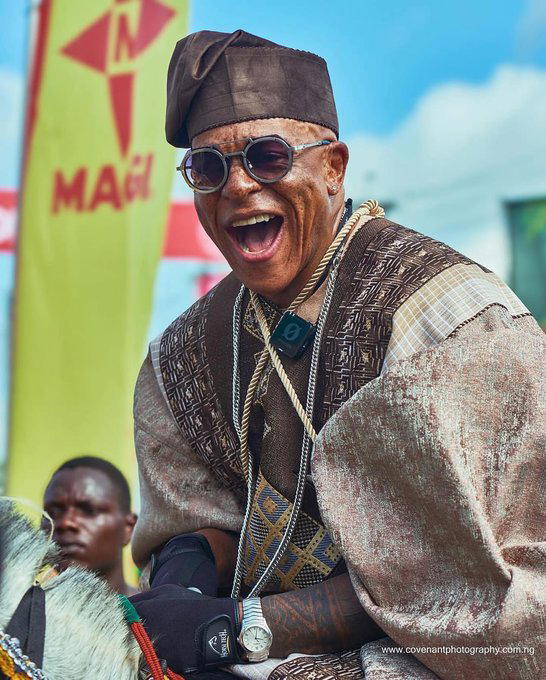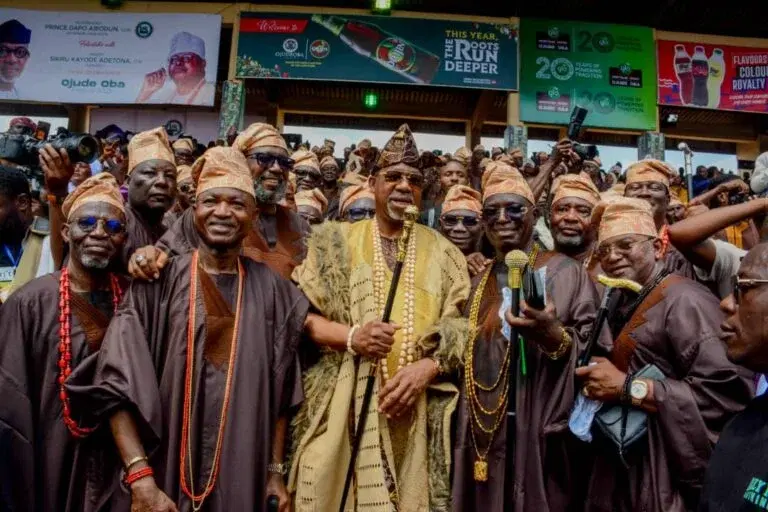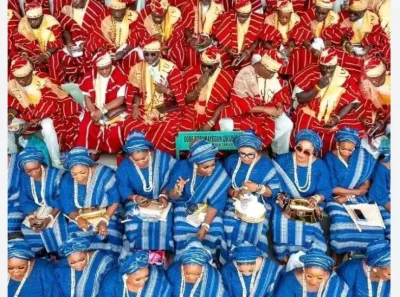Again, ‘chaotic’ Ojude Oba 2025 fails to meet global standards
Despite its global attention and cultural significance, the 2025 edition of the Ojude Oba Festival in Ijebu Ode, Ogun State, again struggled under the weight of poor organisation, outdated infrastructure, and subpar hospitality. What should have been a world-class celebration of Yoruba heritage became yet another case study in how not to host an international cultural event.
Each year, shortly after the end of Eid al-Fitr, the city of Ijebu Ode becomes the focal point of Yoruba cultural expression. The Ojude Oba Festival, originally a simple post-Ramadan tribute by early Muslim converts to the Awujale (the traditional ruler of Ijebu land), has grown into a dazzling display of pageantry, identity, and communal pride.
Today, it draws crowds from around the world, inspires millions of social media interactions, and is even being proposed for UNESCO cultural heritage status. But as its visibility increases, so do its flaws.
Global attention, local dysfunction

The transformation of the Ojude Oba Festival over the decades is impressive. From its humble beginnings, it has evolved into a major cultural occasion, bringing together religious devotion, fashion, traditional authority, and commerce. One of the most anticipated features is the parade of Regberegbe (age-grade groups), elegantly dressed participants, and horse-riding nobles in colourful procession.
Recent editions have drawn global interest, especially following viral moments such as Farouq Oreagba’s iconic appearance in 2024, which positioned Ojude Oba as both a cultural and fashion statement. These developments have added international flair to the event.
But popularity alone isn’t progress. In 2025, it became even clearer that the festival’s infrastructure has not caught up with its rising profile.
A city unprepared

The primary venue — the Ojude Oba Arcade, located within the Awujale’s palace complex — is no longer sufficient to hold the swelling crowds. This year, several attendees fainted due to overcrowding and heat stress. Access routes were jammed, and the absence of crowd management made movement risky.
As someone who travels to document African heritage events, I found it nearly impossible to capture quality footage or enjoy the visual elements of the festival due to the suffocating congestion. The festival is now struggling to accommodate the very attention it has attracted.
Equally troubling was the city’s road network, which remains in poor condition. Streets filled with potholes and dust made commuting within Ijebu Ode a test of endurance — especially for elderly guests or pregnant women.
An embarrassing lodging experience
My accommodation experience at Skoley Suites Hotel was a personal low point. The establishment, a converted residential block, charged ₦25,000 per night for a room that lacked running water, food service, and basic customer care. After spending the day filming under the sun, I returned to discover there was no water to bathe, flush, or even wash my hands. The explanation: “the water pump wasn’t working.”
For an event that aspires to international recognition, the hospitality sector remains embarrassingly underdeveloped. If such experiences happen to local journalists, one can only imagine the frustration of foreign guests who expect better.
Economic Gains, But at What Cost?
There’s no doubt the Ojude Oba Festival brings significant income to the local economy. Hotels fill up early. Transporters, vendors, entertainers, and artisans enjoy booming business. The city is momentarily transformed into a marketplace buzzing with activity.
Yet this commercial success is not matched by meaningful reinvestment. There are still too few hotels that meet acceptable standards. Basic infrastructure remains poor. Emergency services are stretched thin. And the city, despite its festive glow, feels more overwhelmed than organised.
The Path to Progress
If Ojude Oba is to be a genuine contender for UNESCO recognition or any global tourism accolade, it must embrace long-overdue reforms. Cultural pride is not enough — proper planning and professional execution must follow.
Here are steps that must be taken before the 2026 edition: Expand the venue: A larger, purpose-built arena outside the palace would better accommodate the growing crowds.
Decentralise activities: Spreading festivities across neighbourhoods would reduce congestion and offer visitors a more intimate experience.
Invest in hospitality: Ijebu Ode needs more standard hotels and trained service providers to handle the influx of guests.
Improve road networks: Visitors shouldn’t need to endure dangerous, broken roads just to attend a cultural celebration.
Professionalise logistics: Crowd control, medical response, media access, and general coordination must be upgraded.
Final Thoughts
The world is watching. And while the vibrant costumes and captivating parades continue to impress, they are not enough. Ojude Oba must grow beyond aesthetics. It must prove that it is not only culturally rich, but also structurally sound.
With 365 days until the next edition, Ijebu’s elites, public officials, and festival planners have an opportunity to rewrite the narrative. Let us not wait for a tragic incident to spur change. The time to act is now.
Desmond Ike-Chima
Travel Journalist | YouTuber | African Culture Advocate
Writing from Lagos, Nigeria


